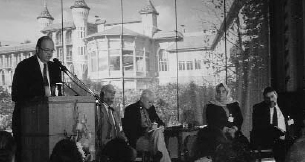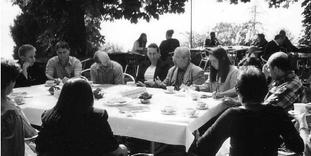News from the Center for World Religions, Diplomacy and Conflict Resolution
News from the Center for World Religions, Diplomacy and Conflict Resolution
 The Center for World Religions, Diplomacy and Conflict Resolution (CRDC) was established at ICAR in 2003 when Marc Gopin was named as the first James H. Laue Chair of World Religions, Diplomacy and Conflict Resolution. The Center spent its first year developing its Advisory Board.
The Center for World Religions, Diplomacy and Conflict Resolution (CRDC) was established at ICAR in 2003 when Marc Gopin was named as the first James H. Laue Chair of World Religions, Diplomacy and Conflict Resolution. The Center spent its first year developing its Advisory Board.
Its members now include David Trickett, founder of the Jefferson Circle (Chair); Elisabeth Hoffman, President, Catalyst Fund (Founding Chair); Zainab al-Suwaij, Executive Director, American Islamic Congress; R. Scott Appleby, John M. Regan Jr. Director of the Kroc Institute for International Peace Studies, University of Notre Dame; Patrice C. Brodeur, Canada Research Chair on Islam, Pluralism and Globalization, Faculty of Theology and Science of Religions, University of Montreal, Quebec, Canada; Rachel Cowan, Director, Spirituality Institute; Robert Eisen, Associate Professor of Religion and Judaic Studies, George Washington University; Joseph Montville, Senior Associate, Center for Strategic and International Studies; Abdul Aziz Sachedina, Professor of Islamic and Shi'ite Studies, University of Virgina; and Krister Stendahl, Mellon Professor of Divinity Emeritus, Harvard University.
The Center for World Religions, Diplomacy and Conflict Resolution (CRDC) moved along with ICAR to its new location in Arlington. In January-February 2004, CRDC staff member Dena Hawes was a facilitator for interfaith dialogues with Jewish, Muslim, and Christian teenagers and adults as part of a program designed and organized by the ICAR Working Group on Religion and Conflict. In Spring 2004 Center Research Professor Peter Weinberger completed his research on religion and peace in Israel and Palestine. A full-text copy of the paper, “Incorporating Religion into Israeli-Palestinian Peacemaking: Recommendations for Policymakers,” can be found on the CRDC website, http://www.gmu.edu/departments/crdc/. Weinberger gave an ICAR Brown Bag presentation on the same topic on March 23, 2004.
 June 2004 held a flurry of activity for the Center. CRDC board members Abdul Azziz Sachedina, Krister Stendahl, and Marc Gopin were scholars in residence at the National Cathedral’s College of Preachers for two weeks in June. This event, bringing together clerics from the Abrahamic faiths, was conceived and developed by CRDC Senior Fellow Joseph Montville. Also in June, the Center sponsored a Washington Consultation on Religion and Diplomacy that brought together scholars, practitioners, and activists for an engaging discussion on religion and conflict in the world today, and to brainstorm ways for the newly established CRDC to contribute to peace.
June 2004 held a flurry of activity for the Center. CRDC board members Abdul Azziz Sachedina, Krister Stendahl, and Marc Gopin were scholars in residence at the National Cathedral’s College of Preachers for two weeks in June. This event, bringing together clerics from the Abrahamic faiths, was conceived and developed by CRDC Senior Fellow Joseph Montville. Also in June, the Center sponsored a Washington Consultation on Religion and Diplomacy that brought together scholars, practitioners, and activists for an engaging discussion on religion and conflict in the world today, and to brainstorm ways for the newly established CRDC to contribute to peace.
Finally, the Center in June 2004 cosponsored a unique event in Morocco, with Initiatives of Change and The Center for Islam and Democracy. Board members Patrice Brodeur and Robert Eisen, as well as CRDC's Senior Fellow Joseph Montville and Director Marc Gopin, engaged in an intensive conference engaging members of the three Abrahamic traditions and senior representatives of Morocco, the Arab League, United States Agency for International Development and several other organizations. The relationships created in Fez were extraordinary, and several initiatives are emerging from that event.
Along with Initiatives of Change, in August 2004 CRDC co-sponsored a conference in Caux, Switzerland entitled “Agenda for Reconciliation,” which brought together numerous groups from several regions of conflict. This summer's conference focused on the future of the Geneva Accord, and relations between Palestine and Israel, with particular reference to religion. For seven days in August, signatories of the Geneva Accord, as well as a number of Israeli and Palestinian civil society activists met with CRDC board members Zainab al-Suwaij, Patrice Brodeur, Robert Eisen, Libby Hoffman, and Joseph Montville as well as ICAR faculty member Kevin Avruch and select ICAR students.
In November 2004, the Center sponsored a forum on The Role of Elections in Post-Conflict Reconstruction: The 2004 Afghanistan Election. Speakers included The Honorable Peter R. Chaveas, Senior Research Professor at the School of Public Policy, George Mason University, and former U.S. Ambassador to Sierra Leone; The Hon. Peter Tomsen, Ambassador in Residence at the University of Nebraska at Omaha, and former U.S. Special Envoy and Ambassador on Afghanistan; Dr. Marina S. Ottaway, Senior Associate in Democracy and Rule of Law at the Carnegie Endowment for International Peace; and Ms. Sima Wali, President of Refugee Women in Development.
The forum was moderated by CRDR Director Marc Gopin and ICAR Professor Terrence Lyons and opened by CRDC Research Associate Neamat Nojumi. The Center chose November 16, United Nations Tolerance Day, for a reception to celebrate the publication of Gopin’s book, Healing the Heart of Conflict: Eight Crucial Steps to Making Peace with Yourself and Others (Rodale Press).
In December 2004, the CRDC and the United States Institute of Peace co-sponsored a day of dialogue between six Saudi Islamic scholars and a group of Jewish scholars as part of a week-long encounter between the Saudi group and others in Washington. The purpose of the day of meetings was the creation of linkages and friendships leading to a reduction of stereotypes that have plagued the Jewish-Islamic encounter, and to lay the groundwork for shared discussion on legal reform, religious tolerance and new definitions of Jewish-Islamic relations.
Board Member Joe Montville is working on his book, Children of Abraham: An Understandable Guide to Christianity, Judaism and Islam. Commissioned by the Tannenbaum Center for Interreligious Understanding, Children of Abraham is expected to be published in the Spring of 2005 and will include a foreword contributed by Prince El-Hassan bin Talal of the Kingdom of Jordan. Research Associate Neamat Nojumi is writing an article for the Brandywine Journal on Islam in Central Asia. He is also working on a project with the United States Institute of Peace (USIP) on the role of customary law (norms and traditions used outside of the legislative court system, such as marriages and alternative dispute resolution forms) in the formal justice system in seven Central Asian countries, including Afghanistan. He recently finished a study on human security in Afghanistan, specifically access to the justice system and methods of improving democratic traditions at the grassroots level.
CRDC Director Marc Gopin, has been consulting with private foundations, policymakers, NGO professionals, and religious scholars on religion and conflict. The Center has also focused on outreach to Christian evangelical community leaders.
More information and updates can be found on CRDC’s website at http://www.gmu.edu/departments/crdc/




